From homicide prosecutor to chief judge: Charles Roberts’ reflects on 40-year legal career
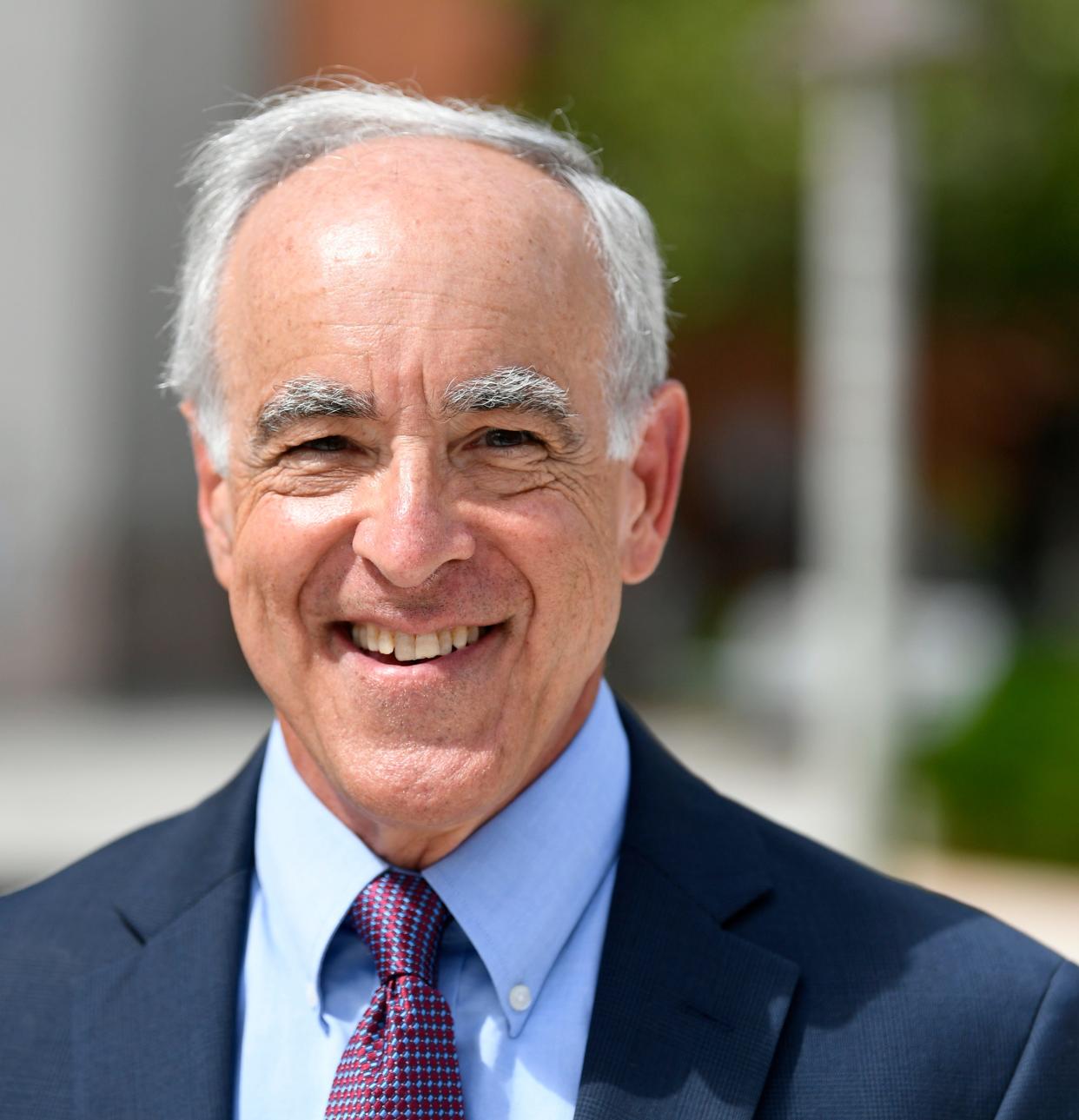
Coming from a military family, Judge Charles E. Roberts faced a tough decision at the cusp of his career: follow in the footsteps of his father and two brothers by accepting a position with the Army JAG Corps. or forge his own path following his newfound love of the criminal trial process.
The path he choose put him at the forefront of introducing the first DNA evidence into trials in Florida; prosecuting high-profile cases including the murder of Sheila Bellush, a mother of quadruplets who were home during the murder; and establishing changes in the 12th Judicial Circuit that remain in place today.
Roberts retired on June 30 after more than 40 years in law, first as a chief homicide prosecutor, then as a judge and chief judge of the 12th Judicial Circuit, which encompasses Sarasota, Manatee and DeSoto counties.
In case you missed it: Murder of Sheila Bellush, Sarasota mom of quads, featured on CNBC series, 'Blood & Money'
In other Sarasota Court news: What's happening in 'Take Care of Maya' case? Hearing sets parameters for jury selection
Roberts is known by fellow judges and local attorneys for his wisdom, calm demeanor, compassion, and attention to detail in the cases he presided over and prosecuted.
“We hope that anyone who serves this community as a judge recognizes the responsibility that they have,” Sarasota Judge Stephen Walker said. “Judge Roberts did that, and he took his responsibilities very seriously, and he served every day with dignity.”
Early career begins with passion for criminal court
Born in Washington D.C. in 1955, Roberts’ childhood was spent growing up overseas in countries like Switzerland and Yugoslavia because of his father’s work in the United States Foreign Service.
The Roberts family returned stateside during his high school years, and after graduating, Roberts attended Duke University, where he received his bachelor’s degree in political science and French.
Roberts then graduated from American University’s Washington College of Law in 1981, where he fell in love with the criminal trial process.
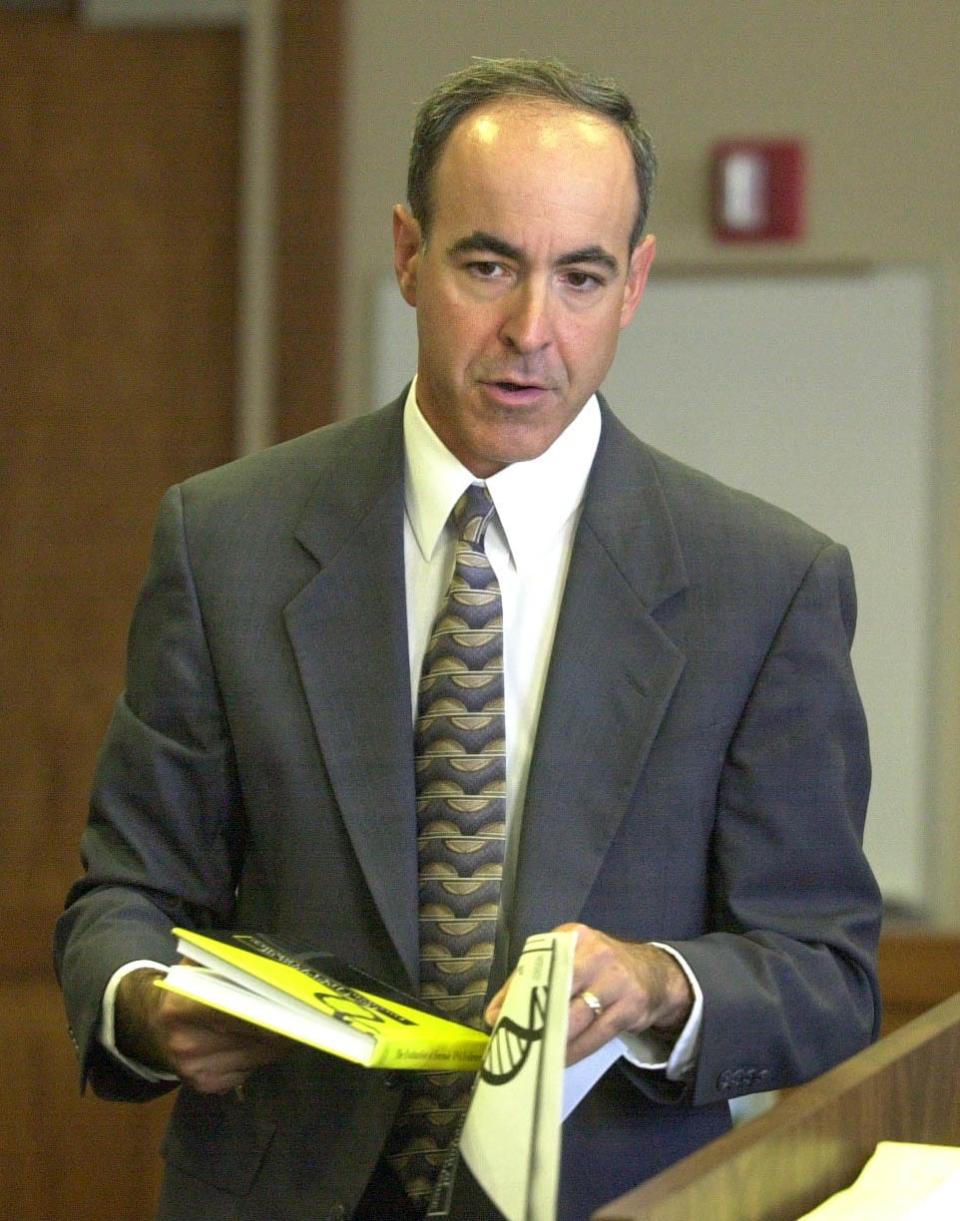
“I think, the being in the courtroom and the preparation for a trial and presenting the evidence and persuading a jury of your position, the competition, all of that really intrigued me,” Roberts said.
While Roberts had internships with the Army Judge Advocate General’s Office, spending two summers in Washington D.C. and Germany, he chose to not pursue a career in the military. Instead, a good friend from law school received a job in Fort Myers and encouraged Roberts to apply.
At the time, Florida had a program allowing interns to become certified legal interns, which allowed them to prosecute cases before they became a member of the Florida Bar.
Following graduation, Roberts applied to work at State Attorney’s Offices from Washington D.C. to Florida and accepted a job in the 20th Judicial Circuit, which encompassed Charlotte, Collier, Glades, Hendry and Lee counties.
He moved to Punta Gorda in the fall of 1981 to become an assistant state attorney.
Life in sleepy Punta Gorda was a change of pace from D.C., but it wasn’t without its own shocking events. Just months after Roberts had moved, his supervising attorney, Eugene Barry, was shot and killed by the wife of a man whom Barry had prosecuted.
It was also during his time in Charlotte County that Roberts met his wife, Valerie, a fifth-generation Floridian. The two wed, settling in Sarasota after Roberts accepted a job in the 12th Judicial Circuit Court, and had three kids, Sherra, Chelsea and Trevor.
In 1989, Roberts became the first prosecutor in the circuit and one of the first in Florida to present DNA evidence in the trial against David Stephens, who was convicted of burglary and violent rape.
Roberts said while he hadn't been good at science in school, he had to really understand the science behind DNA to be able to educate judges and juries.
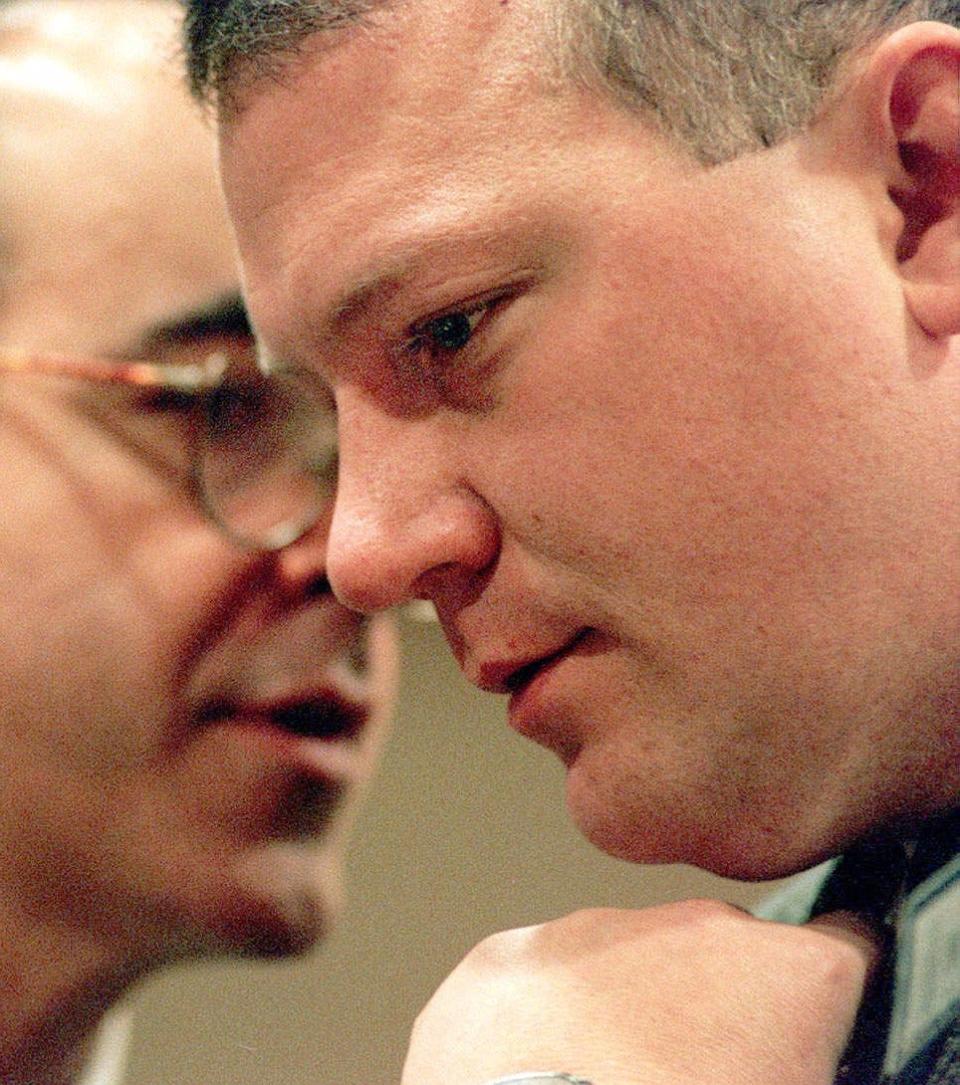
Sarasota defense attorney Derek Byrd remembers watching Roberts as a prosecutor, describing the scenes between him and assistant public defenders Adam Tebrugge and Jim Slater as if one were watching a legal drama. Both sides were professional and respectful of the other side while vehemently arguing their cases.
Roberts was also the lead prosecutor in two cases connected to the killing of Sheila Bellush in 1997. The mother of quadruplets was found murdered by her 13-year-old daughter just weeks after moving to Sarasota following a divorce and messy custody battle with her ex-husband, San Antonio millionaire Allen Blackthorne.
The cases had been challenging, Roberts said, dealing with four defendants spanning two states but the outcome was successful. Both defendants in Florida were found guilty and sentenced to life in prison.
Sarasota Judge Charles E. Williams first met Roberts when he was a prosecutor.
“He was always even-tempered as a prosecutor,” Williams said. “He was very rational. He never took indefensible positions as a prosecutor, he was always well prepared, and always maintained a very calm and very positive demeanor.”
Read more: Meet the judge set to take over the helm of the 12th Judicial Circuit Court as chief
Earlier court coverage: Wife takes the stand in Panitz trial A prosecutor tries to show that she hated Ralf Panitz's ex-wife, Nancy Campbell.
'Someone that we as the judiciary were very proud of'
In 2002, after more than 20 years as a prosecutor and being an advocate for victims and victims’ families, he was ready for a new role — a judge.
Roberts ran against three opponents in the primaries, including Tebrugge, and private lawyers Susan Chapman and Laurie Zimmerman. He faced Chapman in the general election, and won, taking his place on the bench in 2003. From that election on, he ran uncontested until his retirement.
Byrd said he always thought Roberts was a fair judge, adding he was tough on gun cases and violence.
“When career prosecutors move to the bench, they are typically ‘pro-state.’ However, as they gain more experience on the bench, that bias wanes. I have witnessed this firsthand with Judge Roberts,” Byrd said in a written statement. “Judge Roberts actually was our specialty courts judge at the end of his career which shows his compassionate understanding of individuals with mental health and/or substance abuse issues.”
Roberts also remained active with the Florida Bar, often attending Bar functions, giving educational presentations, and being seen outside of the courtroom, which Byrd pointed out was rare as most judges once appointed to the bench seem to distance themselves.
Roberts' contributions to the court go beyond just his decisions in cases.
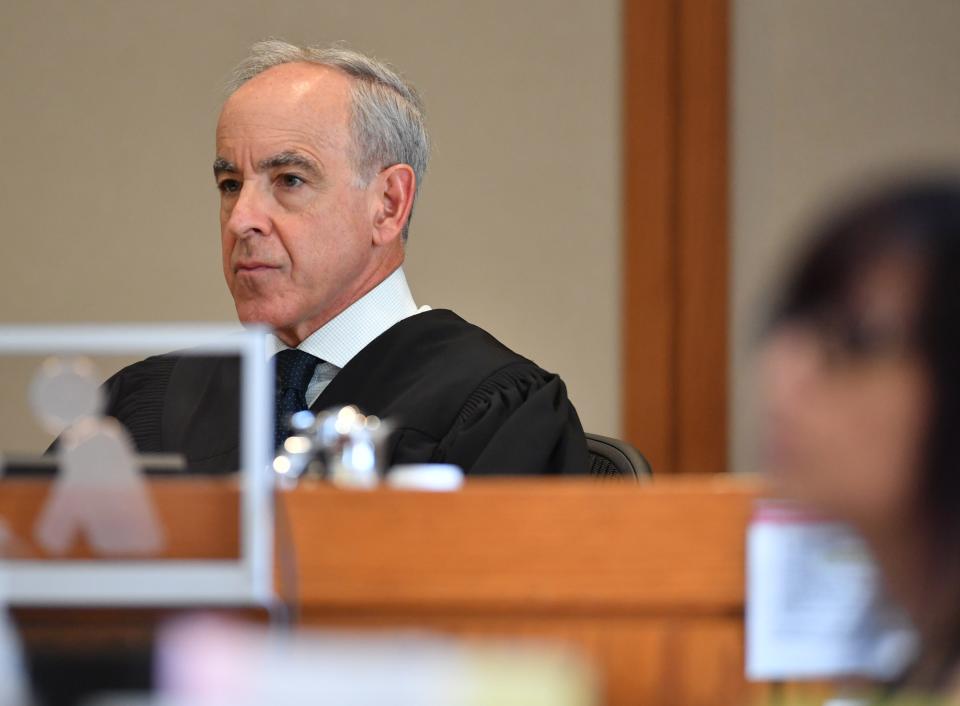
In 2005, he put into place a weekly Criminal Case Management system that has allowed early meaningful discussion of cases, helping to conclude them quickly. Roberts also established the weekly Early Case Resolution docket for felony violation of probation cases. The process helped to reduce the jail population by bringing violators to court earlier than they would have otherwise appeared, thus moving up sentences for offenders.
In 2021, Roberts became the chief judge of the 12th Judicial Circuit while still in the midst of the COVID-19 pandemic, dealing with restrictions that had been placed on judicial centers across the state and nation and the criticisms from those for and against the restrictions. Williams said Roberts was able to stay above the fray and did what was best for the public and the justice system.
Previous reporting: Right choice in murder case
Sarasota court news: Jury finds Sarasota man, 20, guilty of murder, attempted murder in 2019 shooting
“He never hesitated about being willing to step in and help his colleagues, and despite the fact that it might be an enormously complex case, he never got rattled,” Judge Walker said. “He always handled things with decisive and correct decisions, and he was someone that we as the judiciary were very proud of because of the fine work he did.”
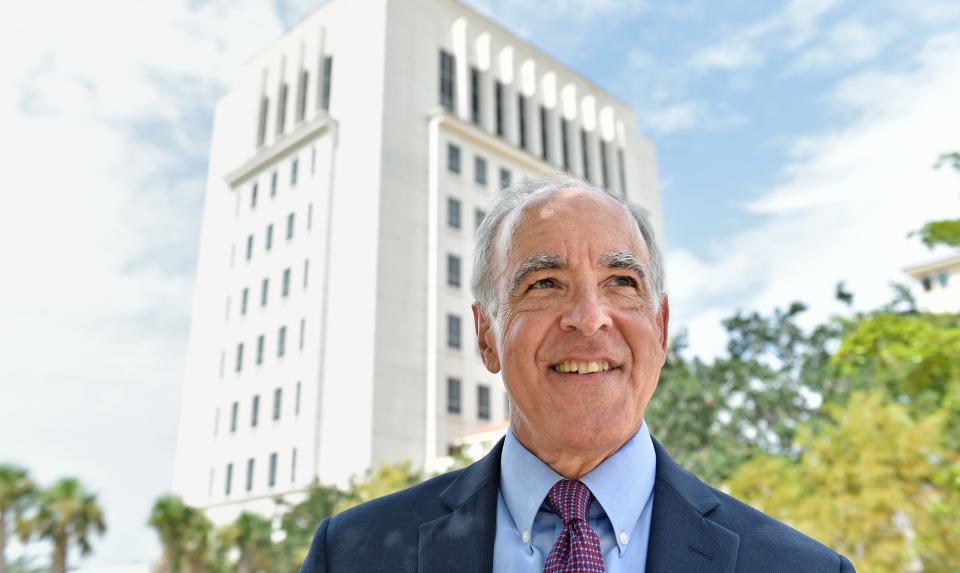
Walker was fond of knocking on his closest friend’s chamber door at around 3 p.m. or whenever he had a 10-minute break to chat over a shot of espresso from the machine that stood in Roberts’ chamber. It had become like a ritual.
“It was quick, but it was always an opportunity for a quick, fun story about what’s going on and check in with one another,” Walker said, adding Roberts was a coffee connoisseur.
Walker kept the cup from the last espresso Roberts made for him on his last day in the courthouse. It sits in a cabinet in his office.
Judge Roberts’ compassionate understanding in the specialty courts
Jordan Wallach received a second chance at life the day he was sentenced to two years in a Florida state prison by Roberts on April 5, 2019.
Wallach, 68, began practicing law in Sarasota in 1979 and was a divorce and family attorney at the time he was arrested in 2018 and charged with stealing more than $200,000 from clients. Wallach explained that he relapsed due to the stress from carrying guilt over his actions.
He was facing up to 30 years in prison but entered into an open plea. Roberts was the presiding judge and had known Wallach for years. Not only that, but Roberts was also very attuned to addiction, alcoholism, and mental illnesses, Wallach said.
Wallach received 24 months in prison — where he began his recovery process and leaned into his faith — and 28 years of probation with the condition he would pay monthly restitution to those he’d stolen from.
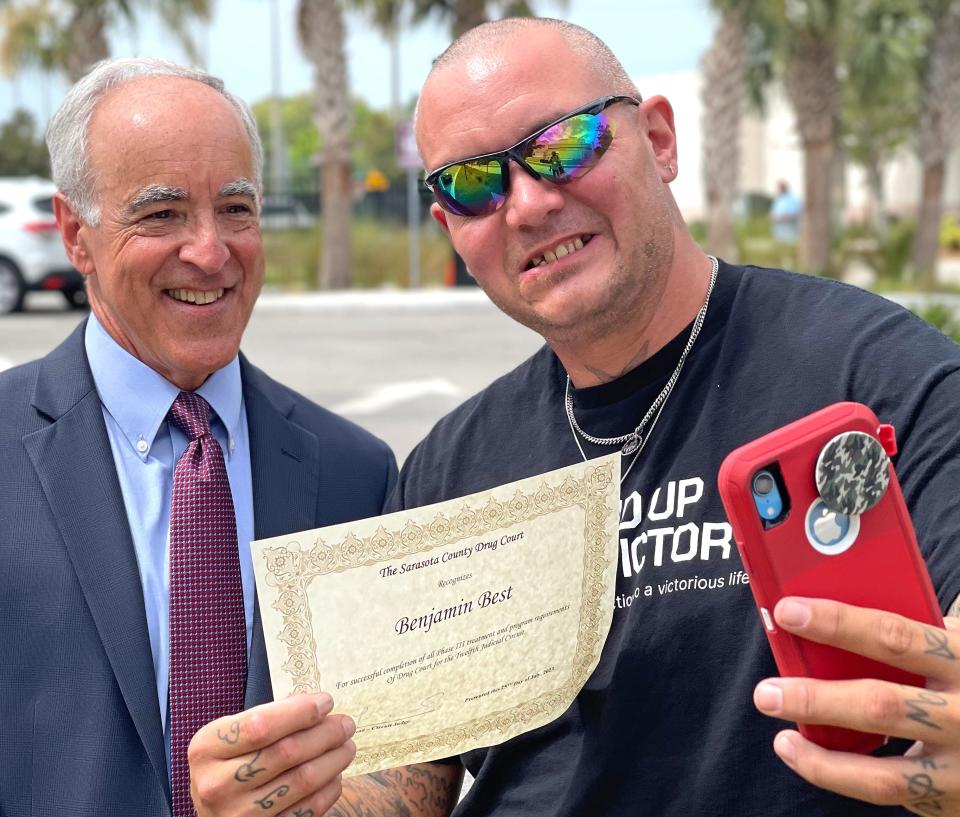
Wallach, who had also practiced before Roberts and saw firsthand Roberts’ compassion with his own clients, said the judge was kind, yet firm when he delivered his sentence. It was the awakening he needed to re-center his life.
“Judge Roberts saved my life,” said Wallach, who was released from prison in 2021 and now works as a legal assistant in the 12th Judicial Public Defender’s Office. Wallach has since re-centered his life around his faith and the 12-step process of recovery.
Retirement plans
Roberts has no plans of leaving the Sarasota community where he has lived with his wife for almost 40 years. He’s excited to spend time traveling across the U.S., including some national parks, which have been their favorite vacation spots in the past. The couple will also venture abroad.
While Roberts is glad to be able to relax a little, he sees himself still staying connected to the legal system, including coming back as a senior judge to help out with caseloads and volunteering with Teen Court of Sarasota.
He also plans to continue teaching at the Florida Judicial College, where he’s been teaching about criminal law at the college for years, including educating others on death penalty law.
Gabriela Szymanowska covers the legal system for the Herald-Tribune in partnership with Report for America. You can support her work with a tax-deductible donation to Report for America. Contact Gabriela Szymanowska at gszymanowska@gannett.com, or on Twitter.
This article originally appeared on Sarasota Herald-Tribune: Sarasota Chief Judge Charles E. Roberts retires after 40 years in law

